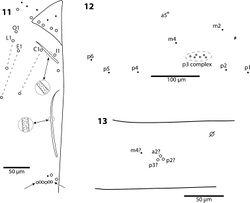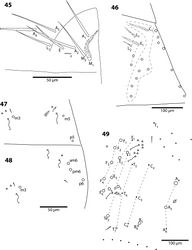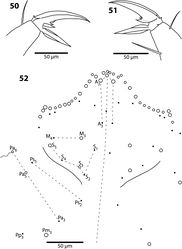Difference between revisions of "Trogolaphysa belizeana"
m (Imported from ZooKeys) |
m (1 revision) |
(No difference)
| |
Latest revision as of 13:28, 13 August 2013
| Notice: | This page is derived from the original publication listed below, whose author(s) should always be credited. Further contributors may edit and improve the content of this page and, consequently, need to be credited as well (see page history). Any assessment of factual correctness requires a careful review of the original article as well as of subsequent contributions.
If you are uncertain whether your planned contribution is correct or not, we suggest that you use the associated discussion page instead of editing the page directly. This page should be cited as follows (rationale):
Citation formats to copy and paste
BibTeX: @article{Soto-Adames2013ZooKeys323, RIS/ Endnote: TY - JOUR Wikipedia/ Citizendium: <ref name="Soto-Adames2013ZooKeys323">{{Citation See also the citation download page at the journal. |
Ordo: Entomobryomorpha
Familia: Paronellidae
Genus: Trogolaphysa
Name
Trogolaphysa belizeana Palacios-Vargas & Thibaud, 1997 – Wikispecies link – Pensoft Profile
Material examined
Two paratypes; Belize: Cayo District, Actun Chapal cave, 7 km SE of Benque Viejo del Carmen, 10.XII.1992, W.R. Elliott.
Additions to the original description.
Head. Dorsal chaetotaxy of the head identical to that of Trogolaphysa jacobyi sp. n., with macrochaetae A0, A2, A3, M3, S3, S5, Pa5 and Pm3. Labral margin smooth. Sublobular plate of outer maxillary lobe without setae-like appendages. Labial papilla E with lateral appendage reaching tip of papilla; 5 proximal smooth labial setae present, seta z (Soto-Adames 2010[1]) longest. Labial triangle formula as M1M2rEL1L2A1-5 (Fig. 45): M1 ciliate, shorter but thicker than M2; r short, stout, apically acuminate; A2 close to r. Postlabium with few scales; columns ICEL with 7732 setae (Fig. 46); seta L2 shortest; ventral cervical setae 6+6. Body. Dorsal macrochaeta formula as 62/3–43/0343+0+11. Mesothorax with macrochaetae p2, p3 and a5, and microchaetae m4 and p5 clearly visible; setae p1, m2 and p6 obscured. Metathorax with 3 macro- and 1 microchaetae arranged as in Trogolaphysa giordanoae sp. n. (Fig. 13). Abd. 1 with at least three inner microchaetae, apparently without a6, but lateral field of segment not clearly visible. Abd. 2 chaetotaxy normal (Fig. 47): with bothriotricha m2 and a5, sensillum as, macrochaetae m3 and m5, setae a6, m6 and p5, and fan-shaped supplementary setae around bothriotrichal complexes. Abd. 3 (Fig. 48) with insertion of bothriotricha m2, a5 and m5, macrochaetae m3, a7, pm6 and p6, and sensillum d2 normally placed. Chaetotaxy of Abd. 4 as in Fig. 49: inner macrochaetae A4, A5, B5 and B6 present, B6 smallest; outer macrochaetae T7, D3, E2, E3, E4, F1, F2, F3, F4, one member of series Fe and one posterior setae of unclear homology present; relative position of bothriotricha normal; microchaeta B4 absent, microchaeta Te1 present. Posterior setae 7+7. Intersegmental membrane between Abd. 4–5 with at least 4 lenticular organs, actual number of organs unclear due to folding of membrane.
Legs. Claw complex of pro- and metathoracic legs as in Figs 50–51. Tenent hair acuminate. Outer and lateral unguis teeth small, inconspicuous; inner paired teeth with one tooth slightly, but clearly larger, unpaired teeth absent. Unguiculus lanceolate. Ventral tube. With 2+2 distal macrochaetae on anterior face.
Remarks
The paratypes examined differ from the original description of the species in having labial seta L2 smooth instead of ciliate, in having only 2 posterior mesothoraxic macrochaetae, in the claws having lateral teeth and in the number of bothriotricha on Abd. 2 and Abd. 4.
Variation in the number of mesothoraxic macrochaetae is also seen in Trogolaphysa jacobyi sp. n and may be related to post-embryonic development. The chaetotaxy of Abd. 2 in fig. 12 of Palacios-Vargas and Thibaud (1997)[2] suggests a composite of the chaetotaxy of Abd. 2 and 3, whereas the bothriotrichal complex of Abd. 4 shown in Palacios-Vargas and Thibaud (1997[2], fig. 13) seems based on an aberrant specimen.
Taxon Treatment
- Soto-Adames, F; Taylor, S; 2013: The dorsal chaetotaxy of Trogolaphysa (Collembola, Paronellidae), with descriptions of two new species from caves in Belize ZooKeys, 323: 35-74. doi
Other References
- ↑ Soto-Adames F (2010) Two new species and descriptive notes for five Pseudosinella species (Hexapoda: Collembola: Entomobryidae) from West Virginian (USA) Caves. Zootaxa 2331: 1-34.
- ↑ 2.0 2.1 Palacios-Vargas J, Thibaud J (1997) New cave Collembola from Mexico and Belize. Southwestern Entomologist 22(3): 323-329.
Images
|


